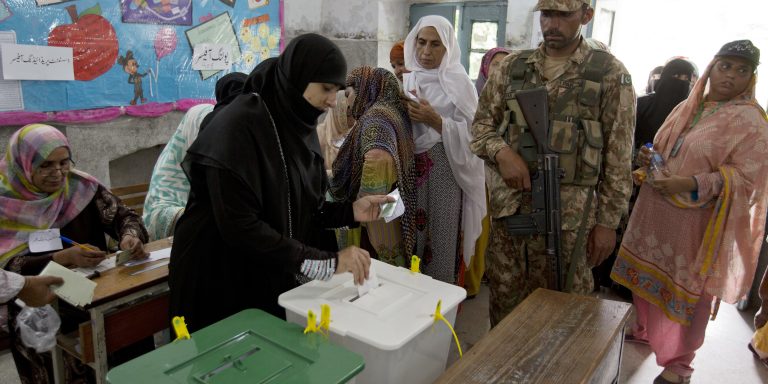INTELBRIEF
July 25, 2018
IntelBrief: A Crucial Election in Pakistan

- On July 25, Pakistan is holding an election in which a civilian government will replace a civilian government for only the second time in the nation’s history.
- Pakistan, a nuclear power, struggles with persistent terrorist groups engaged in violent acts internally, tensions with India, and a proxy war in Afghanistan.
- Relations between Islamabad and Washington have always been uneasy, and Beijing is quietly becoming Pakistan’s most important economic benefactor.
- What happens in Pakistan matters a great deal for the region and beyond; these elections and their aftermath will have long-lasting consequences.
.
Pakistan, a nation plagued with serious political divisions and with a true ‘deep state,’ is holding elections on July 25. Only once in its 70-year history has Pakistan replaced its civilian government with another civilian government through an electoral process. This second such election is not without intrigue—and what happens in Pakistan will not stay in Pakistan. In fact, the results in Pakistan’s election will likely have a radiating impact across a region persistently struggling with instability, tension, and war.
Since independence, Pakistan’s military has played a dominant role in the country’s politics. In 2008, the military’s powers to interfere without recourse were stripped, but it remains the primary force in an otherwise vibrant yet fractious political landscape. There are widespread fears that the military is pushing a soft coup in this month’s elections, throwing its considerable weight behind the candidacy of Imran Khan, a cricket star turned politician who is head of the Pakistan Tehreek-e-Insaf (PTI). His main rival is Shehbaz Sharif, younger brother of former prime minister Nawaz Sharif who is currently in prison for corruption charges after a trial that was widely viewed as flawed. Shehbaz Sharif leads the Pakistan Muslim League-Nawaz(P.M.L.-N), which is thought to be the favorite to win a majority.
Adding to the mix are numerous extremist groups that are actually running in the elections, such as Tehreek-e-Labbaik-Pakistan and Allah-o-Akbar Tehreek (AAT),which replaced the banned Milli Muslim League (MML) as the political party of the Hafiz Saeed-led Jamaatud Dawa (JuD). Pakistan has recently been added by the Financial Action Task Force back to the ‘grey list’ of countries not doing enough to fight terrorist financing. Despite this re-listing as a country struggling to counter the funding of terrorist groups, numerous organizations considered terrorist groups by the Pakistani government are allowed to field candidates in the July 25 elections. For example, Tehreek-e-Labbaik, despite a petition campaign to bar the group from the elections, was allowed to run on a platform of strict enforcement of blasphemy laws, a frightening specter in a country as diverse as Pakistan. A candidate for office, Aurangzeb Farooqi, is the head of the banned Ahle Sunnat Wal Jamaat (ASWJ), which is connected to Lashkar-e-Jhangvi, a group connected to al-Qaeda. Terrorism in Pakistan often spreads beyond Pakistan to not only neighboring countries, including Afghanistan and India, but globally as well.
Meanwhile, Pakistan continues to struggle with deep divisions in its society. Three candidates have been killed in attacks leading up to these elections, and attacks on minority groups like Sufis and Shi’a are a regular occurrence. Pakistan’s 193 million people still struggle with poverty, ecological hardships, and abysmal governance. As it seeks to improve its economy, Islamabad is turning more towards Beijing and away from Washington for economic assistance and trade deals.Massive infrastructure projects under the multi-billion dollar China-Pakistan Economic Corridor (CPEC), part of China’s Belt and Road initiative, are reshaping Pakistan literally and financially, with rapidly growing debts owed in some form to China. The projects include the Gwadar Port project, vital for China as an alternative port for imported oil; the 720 megawatt Karot hydro-electric project in the Pakistani-administrated area of Kashmir; and the badly needed 660kV high-voltage direct current (HVDC) transmission line from Lahore to Matiar that will help address Pakistan’s growing energy crisis.
.
For tailored research and analysis, please contact: info@thesoufancenter.org
[video width="960" height="540" mp4="https://thesoufancenter.org/wp-content/uploads/2018/07/IB-0725.mp4" poster="https://thesoufancenter.org/wp-content/uploads/2018/07/AP_18206262881267.jpg"][/video]